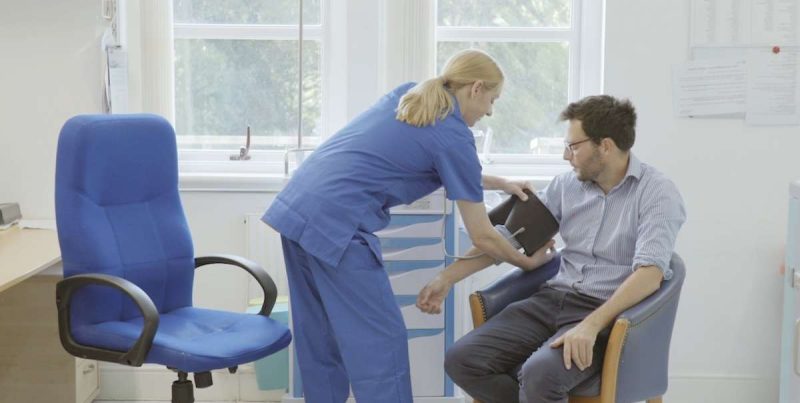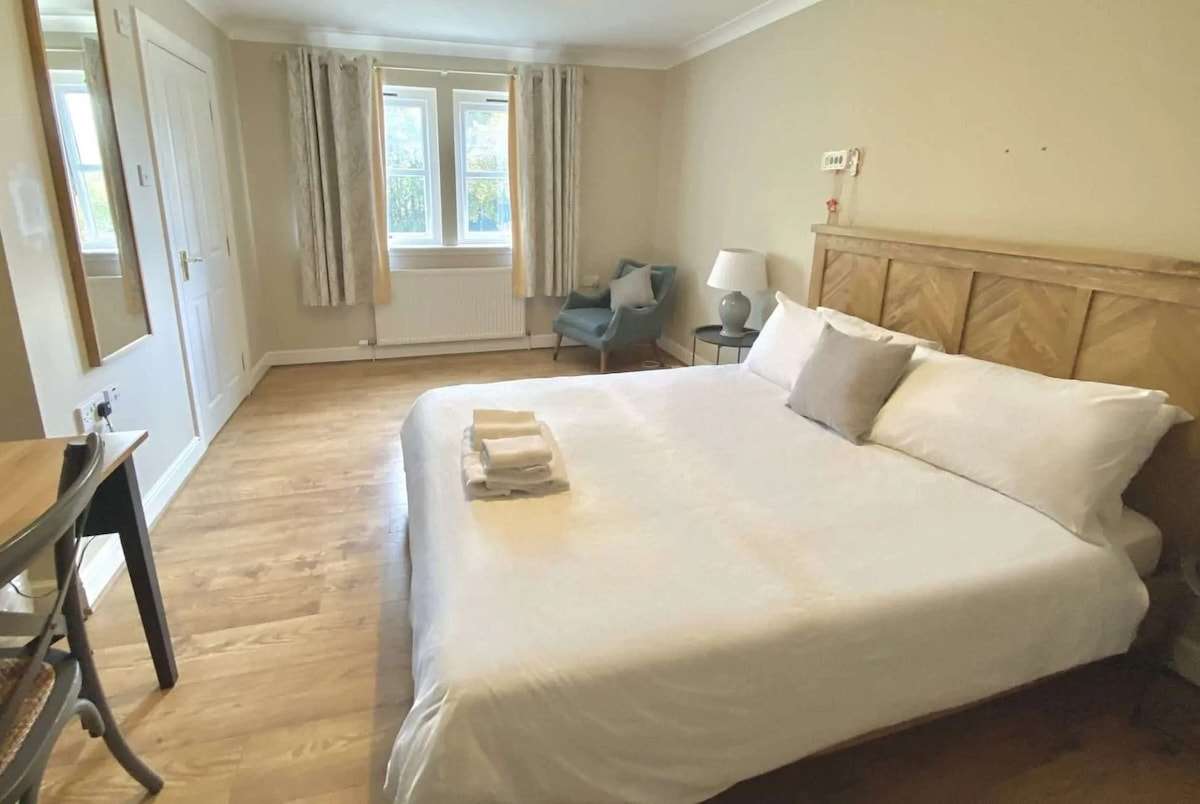
Residential Benzo Detox Treatment
At Castle Craig, we provide medically managed benzodiazepine detox in a safe and residential environment. Our facility offers private and therapeutic surroundings where you can focus on recovery with complete support. We combine evidence-based treatment with a holistic approach, helping to address your physical, mental and emotional wellbeing. Guided by an experienced and multidisciplinary team, you’ll receive expert care tailored to your recovery goals. Set amidst the natural beauty of the Scottish Borders, Castle Craig provides a calming atmosphere, creating an ideal backdrop for healing.
This article explores common questions you may have about benzodiazepine detox timelines, stages and possible withdrawal symptoms. We’ll also outline the importance of safe, medical benzo detox and discuss the different treatments available in rehab. If you’d like to learn more about how our inpatient benzodiazepine detox can help you, we call Castle Craig today on 01721 546 263. You don’t have to face this alone – we’re here to support you every step of the way.
What is Benzodiazepine Detoxification?
Benzo detoxification is the process of allowing your body to safely adjust to the absence of benzodiazepine drugs. It is a crucial first step in addressing dependency and aims to manage benzo withdrawal symptoms while breaking physical reliance on the drug.
Detox from is best carried out in a qualified benzo addiction treatment centre, under professional care to prioritise your safety and comfort. Withdrawal symptoms can vary, making medical support vital for managing challenges during the stages of detox from benzodiazepine drugs. Skilled professionals monitor your progress, providing expert care and guidance to help you move towards a healthier future.

Start Your Recovery at a Residential Rehab Today
What is a Medically Managed Benzodiazepine Detox?
A medically managed benzodiazepine detox involves expert support to help you safely withdraw from benzodiazepines. This type of detox uses tailored medical care to reduce withdrawal symptoms, stabilise your health and carefully minimise the risks associated with stopping these substances.
With round-the-clock care, doctors and clinicians provide support throughout the residential detox process. Medications may be prescribed to ease discomfort, and the detox plan is adjusted as needed. This approach promotes both safety and comfort, providing the foundation for long-term benzo recovery.
Difference Between Medically Managed and Medically Supervised Benzodiazepine Detox
Medically managed benzodiazepine detox involves ongoing medical care and tailored support to address withdrawal symptoms and safeguard your health. Comparatively, medically supervised detox provides general oversight but may not offer the same level of personalised, 24-hour medical intervention and adjustment of treatment plans.
The key difference lies in the intensity of care provided. A medically managed detox is often recommended for more complex or severe benzodiazepine addiction, where immediate medical adjustments may be essential. Both approaches aim to prioritise safety, but medically managed detox provides a higher level of dedicated attention.
Free Benzodiazepine Addiction Assessment
Castle Craig is here to help. We offer free drug addiction assessments at the start of our treatment for benzodiazepine addiction, conducted in a confidential and supportive environment. This allows us to understand your unique needs and circumstances while providing you with expert, compassionate advice.
Following your initial assessment, we can develop a tailored residential treatment plan to guide your benzo recovery path. With decades of experience, our team is committed to providing the care and support you need to rebuild your health and well-being. Take the first step to a brighter future by calling us on 01721 546 263 today.


Benefits of Inpatient Residential Benzodiazepine Detox and Withdrawal Treatment
Choosing residential rehab treatment for benzodiazepine detox offers numerous advantages. It provides a highly supportive environment with access to medical care, structured therapies and safe recovery practices. This holistic approach gives individuals the greatest chance to reclaim their health and achieve long-term sobriety.
Each benefit of residential treatment plays a vital role in supporting long-term benzo recovery. Below, we explore the specific advantages of this kind of care, highlighting why it is an effective choice for overcoming benzodiazepine dependence.
-
Medically Managed Benzodiazepine Withdrawal in a Safe Setting
Medical management during benzodiazepine withdrawal is vital for your safety. Qualified healthcare professionals oversee the process in a prescription drug rehab centre, addressing physical symptoms and complications as they arise. Having this level of guidance significantly reduces risks associated with withdrawal.
A safe setting eliminates external triggers that may escalate benzo withdrawal challenges. By focusing entirely on your health and recovery in a safe space, you can begin the detox process with the security and reassurance that your medical needs will be promptly addressed.
-
Structured Support to Manage Withdrawal Symptoms Effectively
Managing benzodiazepine withdrawal symptoms can be overwhelming without proper support. Inpatient benzo detox offers structured approaches, such as medication-assisted treatment and monitoring, to reduce physical and psychological discomforts. These measures provide relief in ways that an at-home detox cannot.
The structured environment of inpatient benzo detox in the UK also provides consistency in care. Regular check-ins and therapeutic interventions help manage symptoms as they appear, leaving you feeling more in control throughout the detox process.
-
Immediate Access to Benzodiazepine Addiction Treatment Services
With inpatient care, you benefit from instant access to essential addiction treatment services. These include therapy sessions, addiction counselling and medications, all tailored to your specific needs. Every element of care is available the moment you need it.
This proactive approach addresses issues immediately, helping you stay focused on your recovery without unnecessary stress or fear. The availability of comprehensive resources in residential benzo detox centres shows how inpatient treatment places your recovery at the forefront.
-
Breaking the Cycle in a Controlled Environment
Breaking free from benzodiazepine addiction involves stepping away from triggers and harmful patterns. An inpatient setting creates a controlled, substance-free environment, making it far easier to interrupt the cycle of dependency.
Controlled, caring environments provide stability and order, allowing you to concentrate entirely on your benzo addiction treatment plan. Without external pressures or distractions, you are better equipped to rebuild healthy routines and habits for the future.
-
Tailored Treatment Plans for Long-Term Sobriety
No two recovery journeys are the same. At a residential facility, the care team develops bespoke treatment plans to match your unique circumstances and goals. Highly personalised strategies provide the most effective interventions for your needs.
Tailored plans evolve as you make progress in benzodiazepine rehab. Customised drug addiction treatment adapts to your changing requirements, offering the continued support necessary to achieve and maintain long-term sobriety.
-
Emotional and Psychological Support Throughout Detox
Benzodiazepine detox can be emotionally draining, but having consistent psychological support can make a significant difference. Counsellors and therapists work with you to address underlying feelings, fears and anxieties that emerge during benzo withdrawal.
Through one-on-one sessions and group therapy, you learn healthy coping mechanisms that you can carry forward into your life after rehab. This focus on emotional support builds the groundwork for deep-rooted psychological healing and personal strength in both yourself and your recovery.
-
Smoother Transition from Detox to Ongoing Benzodiazepine Rehab
Detox is often the first step in recovery, and moving smoothly into a benzodiazepine-focused rehab programme afterwards is important. Residential care provides a seamless progression from the initial detox to your ongoing therapies without interruption.
By staying in the same facility, you remain within a familiar support system, surrounded by trusted staff. This continuity of care reinforces your recovery goals, building your confidence in navigating the post-detox stages of benzo withdrawal and rehabilitation.
-
A Peaceful Environment to Begin the Path to Recovery
Recovery starts with finding a sense of peace, and inpatient rehabs create that atmosphere. A private, tranquil environment, away from external stress, supports relaxation and mindfulness while aiding the healing process.
Peaceful, confidential rehab settings cultivate a sense of safety and encouragement, allowing you to focus purely on rebuilding your health. Beginning your recovery in such a space inspires hope and determination for a brighter future.
Private Medically Managed Benzo Detox Centre Near Me
Finding the right benzo detox clinic is an important step towards your recovery. Several benzodiazepine detox centres in the UK provide personalised care to address your addiction safely. With expert teams and tailored support, these clinics prioritise your health and comfort, creating a strong foundation for lasting progress. Explore the options below to begin your search for safe benzo detox centres near you.

Contact Castle Craig Residential Detox Centre
Castle Craig is located at West Linton, Edinburgh, United Kingdom, EH46 7DH, in a peaceful, countryside setting. Our tranquil location offers the perfect environment for detoxing from benzos, combining privacy with exceptional care. In our custom-built, 11-bed detox centre, you can focus fully on your well-being away from everyday pressures.
Find Us
01721 546 263
info@castlecraig.co.uk
Castle Craig,
West Linton, Edinburgh, United Kingdom, EH46 7DH
Call us on 01721 546 263 to learn more about our tailored residential treatment for benzodiazepine and drug addiction. Our dedicated team is here to offer compassionate support at every step of your recovery. Don’t wait to take the first step – we’re ready to help you today.
-
How to Find Private Inpatient Benzodiazepine Detoxification Centres Near You
Finding the right inpatient treatment for benzodiazepine detox requires careful consideration. Begin by researching options that fit your needs and offer expert support during this crucial time. You can use the following points to guide your search:
- Search for “Private Benzodiazepine Detox Near Me” or Include Your Location: Use specific search terms, such as “Private inpatient benzodiazepine detox centre near me” or “Medically managed benzodiazepine detox UK,” to find the most relevant options based on your location.
- Look for Medical Supervision and 24/7 Support: A medically managed detox relies on continuous monitoring for safety. Look for a rehab clinic providing safe benzo detox with 24/7 care. It should be led by experienced medical professionals who can adapt detox treatments when needed.
- Read Reviews and Testimonials: Patient reviews can offer an honest perspective. Focus on feedback that highlights the quality of care, the benzodiazepine detox centre’s expertise and success in helping others achieve recovery.
- Consider What’s Included in the Treatment: A comprehensive treatment plan may involve therapy, medical care and aftercare planning. Choose a benzo rehab clinic that covers all essential aspects to support your recovery.
- Enquire About Costs and Payment Options: Understanding drug rehab costs is vital. Some clinics offer flexible payment plans, making treatment more accessible while providing transparency.
- Check if They Accept Health Insurance: Many private rehab clinics collaborate with health insurance providers. Verify if your insurance is accepted, as this can ease the financial burden of treatment.
Find Out About Our Residential Benzo Detox Treatment
At Castle Craig, we offer free benzodiazepine drug addiction assessments as part of our admissions process. This initial step allows us to understand your unique situation and recommend the most appropriate path to recovery with care and compassion.
Our team specialises in creating tailored, medically managed detox and recovery plans for benzodiazepine addiction. With expert medical support and personalised treatment, we will help you regain control and provide the foundation for a healthier future. Contact us today by filling out our online form to take the first step towards long-term benzo recovery.
Free Benzo Addiction Assessment
Taking the first step and asking for help can feel daunting, but our team is here to assist you.
Signs, Symptoms and Effects of Benzo Withdrawal & Detoxification
Benzodiazepine withdrawal and detoxification can cause a variety of physical and emotional challenges. Below are some common signs, symptoms and effects that people may experience during this process. However, this is not a complete list, and each person’s experience may differ based on their circumstances and dependency level.
-
Early Signs of Benzo Withdrawal
The early phases of drug withdrawal can appear within hours or days of reducing or tapering off benzos. The timeframes and severity vary depending on the individual person, the duration of use and the dosage they’ve been taking. Below are some common early signs of benzodiazepine withdrawal to look for:
- Intense fatigue and tiredness: You may feel physically drained and unable to perform routine tasks due to extreme tiredness.
- Increased appetite: Some people may experience an increase in hunger, often as their body attempts to adjust to the changes.
- Depression or low mood: Feelings of sadness, hopelessness or lack of motivation are possible as the body adapts to lower benzo levels.
- Anxiety or emotional unease: A heightened sense of worry, irritability or overall emotional instability can be common during early benzodiazepine withdrawal.
- Slowed reaction time and thinking: Thought processes and physical responses may feel sluggish or delayed, making simple tasks more challenging to complete.
-
Moderate to Severe Symptoms of Benzo Withdrawal Syndrome
Moderate to severe symptoms of benzodiazepine withdrawal can emerge within days or weeks after reducing or stopping use. Severe symptoms may persist longer and often require additional support to manage safely and effectively. Below are some common symptoms to be aware of:
- Powerful drug cravings: Strong urges to use benzodiazepines can surface, making it difficult to resist without professional guidance or support systems.
- Insomnia or disrupted sleep: Difficulty falling or staying asleep is a frequent issue when managing benzo cravings, leaving some people feeling exhausted and irritable during the day.
- Agitation and restlessness: A constant state of unease or irritability can make it difficult to relax or remain still for extended periods.
- Difficulty focusing or making decisions: Mental clarity may feel compromised, leading to confusion or indecision during everyday tasks or important choices.
- Mood swings and emotional instability: Rapid emotional shifts, from anger to sadness, can occur as the brain adjusts to functioning without benzodiazepines.
-
Psychological Effects of Benzo Withdrawal
The psychological effects of benzodiazepine withdrawal can surface within days of reducing or stopping use and may persist for weeks or longer. These effects can be particularly distressing and often benefit from professional care and a strong support system. Below are some common psychological symptoms that may occur when reducing or stopping benzo intake:
- Suicidal thoughts or feelings: Some people may experience troubling thoughts of self-harm, highlighting the need for immediate support and intervention from mental health professionals.
- Severe anxiety or panic attacks: Overwhelming fear or panic can occur suddenly, making it difficult to manage everyday situations without structured support.
- Intense paranoia: A heightened sense of distrust or fear of others may emerge, impacting relationships and daily interactions.
- Hallucinations (visual or auditory) in some cases: Some people may perceive things that are not real, such as hearing voices or seeing visuals, requiring urgent medical attention and a safe space.
- Anhedonia (inability to feel pleasure): A deep sense of emotional numbness can make previously enjoyable activities feel unfulfilling or meaningless during benzodiazepine withdrawal.
-
Physical Signs and Symptoms During Benzodiazepine Detoxification
During benzodiazepine detoxification, physical symptoms can appear within hours or days after stopping use and may persist for weeks. The varying withdrawal symptoms of benzo drugs highlight the importance of detoxing with professional medical attention, ensuring safety and comfort throughout the process. Below are some common physical signs and symptoms that may be experienced when tapering off benzos:
- Headaches: Persistent or recurring headaches are a common symptom, often brought on by the physical stress of benzo withdrawal.
- Muscle aches or general body pain: Widespread discomfort or muscle soreness can occur as the body adjusts to functioning without benzodiazepines.
- Shakiness or tremors: Involuntary shaking or trembling is often linked to the nervous system reacclimating during the detox period.
- Dry mouth or dehydration: Reduced moisture in the mouth can contribute to discomfort and signals the need for increased fluid intake.
- Increased appetite and sudden weight gain: Heightened hunger levels may lead to rapid weight changes during the benzo withdrawal and adjustment phase.
-
Long-Term Effects Without Proper Benzo Detox Support
Without proper detox support, the long-term effects of benzodiazepine withdrawal can linger for months or even years. Managing these effects alone can be overwhelming, which is why professional guidance is essential to promote your safe recovery and reduce the risk of complications. Below are some common long-term benzo withdrawal effects to consider:
- Persistent depression or anxiety: Ongoing feelings of sadness or worry can persist, significantly impacting mental health without appropriate coping strategies or support.
- Long-term sleep issues: Chronic difficulties with falling or staying asleep may affect overall well-being and energy levels for an extended period.
- Cognitive impairments (memory, attention): Struggles with focus, memory retention or decision-making can continue, hindering daily activities and personal progress.
- Ongoing intense cravings: Repeated urges to use benzodiazepines may occur, increasing the challenge of maintaining sobriety without structured assistance.
- Higher risk of relapse and overdose: Returning to benzo use after detox increases sensitivity to the drug, raising the likelihood of accidental overdose without proper care.
If you’re considering detoxing from Benzodiazepines, compassionate, medical support can make a worthwhile difference in navigating withdrawal symptoms and supporting a safer recovery for you or your loved one.

Medications Used for Benzodiazepine Detoxification
Medication may or may not be prescribed during benzodiazepine detoxification. This is determined on a case-by-case basis, depending on the person’s unique needs and the severity of their addiction. Below are some common medications for benzodiazepine detox that may be used in certain situations:
- Diazepam: Diazepam helps manage withdrawal symptoms by providing a long-lasting calming effect, making the benzo tapering process safer and more comfortable. Diazepam (Valium) can be effective when administered carefully within a structured detox setting, however, it carries a risk for dependence and misuse.
- Chlordiazepoxide: Commonly used for its gradual, mild effects, Chlordiazepoxide helps reduce withdrawal symptoms and prevent severe complications during medical benzodiazepine detox.
- Lorazepam: Lorazepam may be used for its shorter duration of effectiveness, allowing precise dosage adjustments to address withdrawal symptoms without prolonged side effects.
- Clonazepam: Clonazepam can help manage benzodiazepine withdrawal by stabilising symptoms, especially in cases with recurring anxiety or seizures during detox.
- Phenobarbital: This medication can aid in withdrawal by controlling seizures and calming the central nervous system during the benzo detox process.
- Gabapentin: Gabapentin eases some of the physical and emotional discomfort associated with withdrawal, including anxiety, muscle tension and mood changes.
- Carbamazepine: Often used for its anti-seizure properties, Carbamazepine can support a more stable and manageable benzo detoxification for those at risk of complications.
- Valproate: Valproate is sometimes prescribed to manage withdrawal by stabilising mood and helping to prevent neurological symptoms, including seizures.
- Antidepressants: Antidepressants can be introduced to address underlying depression or anxiety that may emerge or worsen during medically-managed benzodiazepine detox.
- Melatonin: Melatonin is a natural supplement that supports better sleep cycles, which are often disrupted when managing benzo cravings during detox.
At Castle Craig, we approach the use of detoxification medications with the utmost responsibility to make sure they do not result in a new addiction. We understand that this may be a worry for some patients, and we are here to reassure you that medicines are prescribed only when clinically necessary and are closely managed under the care of our Consultant Psychiatrist and experienced medical staff.
Our goal is to alleviate withdrawal symptoms safely while focusing on your overall recovery and the goal of abstinence. By using evidence-based protocols and regularly assessing your progress, we only use detox medications as a short-term tool to support your transition into sobriety, always prioritising your long-term health, well-being and abstinence.

Contact Castle Craig Today
If you’re struggling with benzo addiction, we understand that this can be a difficult and uncertain time. At Castle Craig, we’re here to help. Our team is ready to answer your questions and provide the reassurance you need to take the first step towards abstinence.
Call us today on 01721 546 263 to speak with our experienced team. Alternatively, you can fill out our online form to get in touch. We’re here to support you and help you move forward with confidence.
Does Health and Medical Insurance Cover Benzo Detoxification Treatment?
Typically, health and medical insurance does cover benzodiazepine detoxification treatment. However, this depends on the coverage levels of your policy and the terms set by your insurance provider. It’s important to check these details with your insurer directly.
If your benzo detox treatment is covered and approved, Castle Craig accepts private health or medical insurance. Our team is available to assist you in understanding our insurance admissions process and making sure that your access to care is as straightforward as possible. Call us 01721 546 263 to ask about our benzo addiction treatment, find out how to approach your insurance provider or give us your authorisation information today.
How Much Does Residential Benzo Detox Cost?
The cost of benzodiazepine detox alone in the UK typically ranges between £1,000 and £6,000 for a 7-10 day detox programme. It is advised, however, that benzo detox be part of a longer rehab treatment plan that includes additional therapeutic elements for sustained recovery. The cost of benzo rehab programmes may range from £650 to £1,500 per day or £4,500 to £10,000 per week, depending on the services provided.
Benzo rehab prices can vary based on your specific needs and the duration of your treatment programme. Factors such as the level of care required and any additional therapies will determine the final cost. All of Castle Craig’s addiction treatments are included in our bespoke pricing, and our admissions team is here to guide you through the process with clarity and care. Contact us for more information about the cost of residential benzodiazepine detox.
Benzo Detox Timeline and How Long It Takes
Benzodiazepine detox is typically the first step in a comprehensive benzo rehab process. Below, we’ll explore typical benzo detox timelines and how long detoxing might take. However, for a more sustainable recovery, it’s advisable to complete a full rehab programme if recommended by a healthcare professional during your initial assessment.
-
Stage 1: Early Withdrawal Symptoms (6–12 Hours After Last Dose)
The first stage of benzodiazepine detox often begins within 6 to 12 hours after the last dose of the drug. During this period, initial symptoms like anxiety, restlessness and trouble sleeping can start to emerge. These initial symptoms occur as your body begins to adjust to the absence of the substance it has become accustomed to.
At this stage, medical care focuses on monitoring your physical and emotional well-being. With professional support, early symptoms can be managed effectively, providing you with the support needed to move past this challenging first phase.
-
Stage 2: Peak Benzo Withdrawal Symptoms (24–72 Hours)
Following the early withdrawal period, benzodiazepine detox symptoms usually intensify and reach their peak within 24 to 72 hours. During the second phase, people often experience heightened anxiety, confusion, shaking and even physical discomfort such as muscle aches. For certain cases, more severe symptoms like seizures may also occur.
This second stage of benzodiazepine detox requires round-the-clock medical attentiveness to provide comfort, safety and reassurance. Medications may be used to ease severe symptoms, and emotional support is provided to help strengthen your determination through this tough period.
-
Stage 3: Subsiding Symptoms and Stabilisation (3–7 Days)
By the third stage, benzo withdrawal symptoms generally begin to subside. Over the following days, the body starts to stabilise and withdrawal intensity eases. Feelings of anxiety and discomfort become more manageable, allowing a sense of normalcy to gradually return.
During this stabilisation period, the focus shifts to supporting your physical recovery while planning the next steps of benzo addiction treatment. The last stage of detox serves as a bridge to your ongoing therapies and programmes, encouraging long-term well-being and setting you up for the next phase of benzodiazepine rehab.

Related Guides on Medically Managed Residential Detox
Detox Centre | Inpatient Detox | Alcohol | Drugs | Cocaine | Heroin | Crystal Meth | Valium | Tramadol | Benzodiazepines | Xanax | Codeine | Opioid | Ecstasy | Morphine |
Inpatient Medically Managed Benzo Detox Treatment Admissions Process
The admissions process for inpatient medically managed benzodiazepine detox at Castle Craig is entirely confidential and handled with the utmost care and respect. We understand how challenging this decision can be, so our team is here to guide you through every step, offering compassionate support and clear information along the way. Whether you are seeking help for benzo withdrawal or benzodiazepine addiction, our admissions process is designed to meet your needs with personalised attention.
- Initial Enquiry and Confidential Consultation: Your first step is to contact us for a confidential consultation. During this conversation (typically around 30 minutes), you can speak openly about your situation and ask any questions you may have about detoxing from benzos. Our friendly clinicians will carefully listen to your concerns and provide clarity on how we can support your recovery. This initial, private and non-judgemental discussion can provide clear insight into what your inpatient benzodiazepine detox could look like at Castle Craig.
- Pre-Admission Benzo Addiction Assessment: Once you decide to proceed, we will arrange a comprehensive pre-admission assessment. This step allows us to evaluate your medical history, the severity of your benzodiazepine dependence and any co-occurring conditions that would benefit from dual diagnosis treatment. We also explore any withdrawal symptoms you might have experienced previously. With these details, we can develop a plan for your benzodiazepine medical detox that is adapted specifically to your needs.
- Confirm Insurance or Funding Options: We’ll guide you through the insurance admissions process or discuss how to pay for rehab using alternative funding options such as private pay. This step is handled transparently and professionally, outlining the cost of benzodiazepine rehab upfront. By clarifying funding details early on, we aim to make the admissions process smoother for you, so you can focus solely on receiving the care you need.
- Confirmation of Admission and Booking: After the necessary details are in place, we will confirm your admission and schedule a date for your treatment to start. At this stage, you’ll receive all the information you need about what to expect during your inpatient benzo detox, as well as practical advice to help you get ready. This phase sets a clear timeline for your treatment and prepares you to begin detox safely.
- Arrival for Benzo Detox and Rehab Treatment: When you arrive at Castle Craig, you will be warmly welcomed into our accredited rehab facility. We will help you settle in, making sure you feel reassured and supported from the start. The initial stage will include a structured benzo detox timeline designed to gradually address your withdrawal symptoms. With compassionate care and professional support, we take you through all the stages of benzodiazepine withdrawal, focusing on your comfort and setting the stage for long-term, lasting recovery.
Your well-being is at the centre of everything we do at Castle Craig. If you have any questions or would like support with starting your admissions process, please don’t hesitate to reach out to us.
Questions About Benzodiazepine Detox?
Contact us to discuss your treatment needs with a licensed clinician.
Find Out About Our Residential Detox Treatment
Castle Craig offers free benzo drug addiction assessments at the start of treatment to help you take the first step towards recovery. Our compassionate team is here to listen, understand your needs and provide the guidance you deserve in a safe and confidential environment.
With us, you’ll receive a tailored treatment plan designed specifically for your recovery goals. During the assessment, we can also provide more accurate information about the cost of residential rehab and the services included, offering transparency and support every step of the way. Call our expert team on 01721 546 263 now to start your journey to health and happiness.
Free & Confidential Assessment
Compassionate, expertly delivered evidence-based practices and a patient-centred approach are at the heart of our treatment model. Request a call-back from one of our professionals on any day of the week.
-
Statistics on Benzodiazepine in the UK
- Between 2015-16 and 2019-20, the percentage of patients with learning disabilities prescribed benzodiazepines decreased by 0.7 percentage points, reflecting a positive trend in reducing dependency.
- Approximately 300,000 individuals in the UK are long-term users of benzodiazepines, despite guidelines recommending a maximum prescription duration of four weeks.
- In 2023-2024, 3,872 individuals entered treatment for benzodiazepine-related issues, showing a slight increase from the previous year.
- In 2022, benzodiazepines were frequently found in polydrug use cases, contributing to the rise in drug-related deaths in England and Wales.
- Over 72% of adults starting treatment in 2023-2024 reported a mental health treatment need, highlighting the importance of integrated care for those with substance misuse issues.
- Benzodiazepines are increasingly seen alongside opiates in drug-related deaths, reflecting the growing complexity of substance misuse cases.
- In the UK, 7.7% of respondents admitted to misusing benzodiazepines, with misuse rates comparable to those in the US.